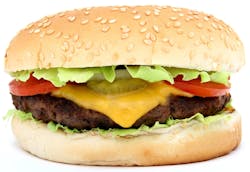Research from the Medical University of South Carolina (MUSC) links a high-fat diet to a molecular switch in the body that turns on the progression of colorectal cancer. College of Medicine Dean Raymond DuBois calls it an important finding not only for scientists but also for anybody who overindulges in high-fat food and red meat.
“Diet matters. And when you up the level of fat in your diet, the cells in your colon change and can eventually become a cancer,” DuBois said.
Colorectal cancer is the second leading cause of cancer-related deaths in the U.S. Because it’s so common, doctors recommend that everyone be screened by the age of 50. People with a family history of the disease should start screening even earlier, by the age of 40. Colonoscopies can spot precancerous polyps, allowing doctors to remove them before they turn into full-blown cancers.
Colon cancer has few warning symptoms until it has taken hold and spread, often to the liver and lungs. So, researchers are looking for better ways to predict, prevent, and intercept cancer through new medical treatments or even possibly nutraceuticals, which are foods designed to prevent and treat disease.
The MUSC-led study, published online in the journal Cancer Research, builds on the idea that certain diets can increase the risk for cancer. The researchers wanted to understand the specific sequence of events that causes colorectal cancer to accelerate. “In the past, we did not know the molecular pathway or molecule at the point of interaction leading to progression,” DuBois said.
The research team, which included scientists from Arizona State University and the Ralph H. Johnson VA Medical Center, focused on cancer in its early stages. “We looked at what happens before a group of cells becomes a full-blown tumor. We found that there is a receptor in the nucleus of colon cells that plays an important role in converting a normal cell to one that is more likely to become a full-blown cancer cell,” DuBois said.
“This receptor is referred to as PPAR delta and it actually interacts with DNA, resulting in significant changes in the regulation of a number of different genes. We completed several laboratory studies in order to show how it was involved in the process of cancer progression.”
DuBois said the key finding in the lab is that they verified that a high-fat diet really does increase the tumor burden dramatically. “It definitely is working, in part, through this nuclear receptor that has been a focus of the DuBois lab for several years. The hope is that by modulating the activity of this receptor, we could reduce the effect of a high-fat diet on promoting tumor progression.
“Obviously, we need to do more work and complete more detailed studies in human tissues collected from patients diagnosed with colon cancer. If we could get an accurate diet history from people who have colon cancer or even premalignant disease, it would allow us to correlate the level of fat in the diet with changes in tumor biology. We’re working on that now.”

